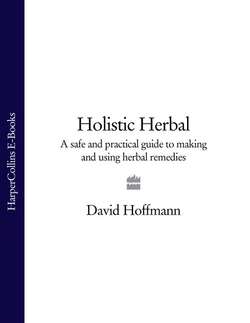Читать книгу Holistic Herbal: A Safe and Practical Guide to Making and Using Herbal Remedies - David Hoffmann - Страница 85
Constipation
ОглавлениеContrary to common belief, constipation is not a disease but a symptom of some underlying problem. This could be inappropriate diet, a liver problem or even a physical blockage in the system. In any case, the cause must be identified and treated, as the long term use of laxatives in chronic constipation can eventually lead to other symptoms such as headaches, colic or even jaundice. Most constipation would not occur if the body were given a well-balanced diet with adequate levels of roughage.
In cases of chronic constipation, the muscles of the intestines have to be retrained to move the bowel content. The movement of the intestinal wall is a complex and highly integrated example of muscle control, designed to push the content onwards at the right time and with the right force. This natural peristaltic movement can be blocked by the long use of laxatives. Two things should be done to retrain the intestines: care should be taken that meals are eaten regularly (same time each day) and small amounts of appropriate herbs should be used to re-stimulate the peristalsis, for instance Cascara Sagrada.
A further factor that should not be underestimated is the attitude and state of mind of the person who is constipated. Somebody who is tense and tight, who wants to hold on to everything and everyone, who cannot relax and let go, whose attitude towards the world is one of taking and keeping rather than of giving and staying open, will often also be constipated. In such cases, relaxation exercises or meditation can be the best laxatives.
When constipation is the result of a disease process, it is important to relieve the symptom whilst treating the cause, otherwise the body might absorb some of the stagnant material from the intestine.
Of all the evacuant herbs available, perhaps the most widely applicable is Rhubarb Root, as it is a prime example of a normalising herb. While in a large dose it is a purgative, taken in small doses it tones and astringes the intestine wall, promotes appetite and can disperse any gas that develops.
Any of the evacuant herbs will work well on their own, but the following mixture combines a number of valuable actions. Barberry aids the liver and the gall-bladder, Boldo stimulates the digestive process, Cascara Sagrada acts on the peristaltic movement, Liquorice is mainly included to mask the bitter taste of some of the herbs, Rhubarb Root is included in a small dose for the above mentioned reasons and Ginger will guard against any colic:
| Barberry | 2 parts |
| Boldo | 2 parts |
| Cascara Sagrada | 1 part |
| Liquorice | 1 part |
| Rhubarb Root | 1 part |
| Ginger | 1 part |
Take a cup of this tea before going to bed.
As an alternative to Boldo, Dandelion can be used and Fennel can be substituted for Ginger, both in the same quantities.
Dandelion
